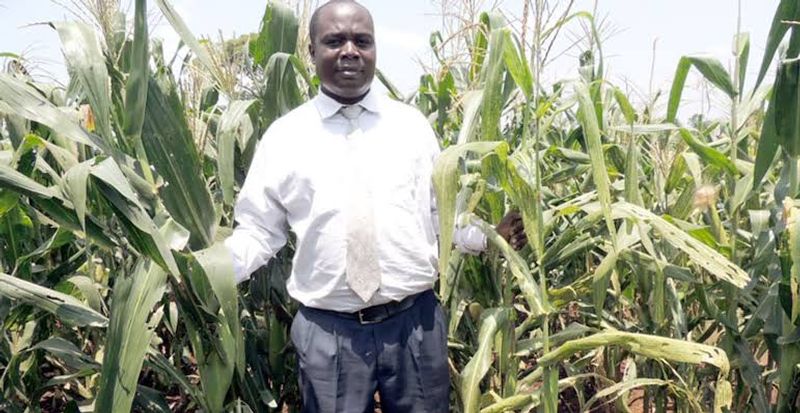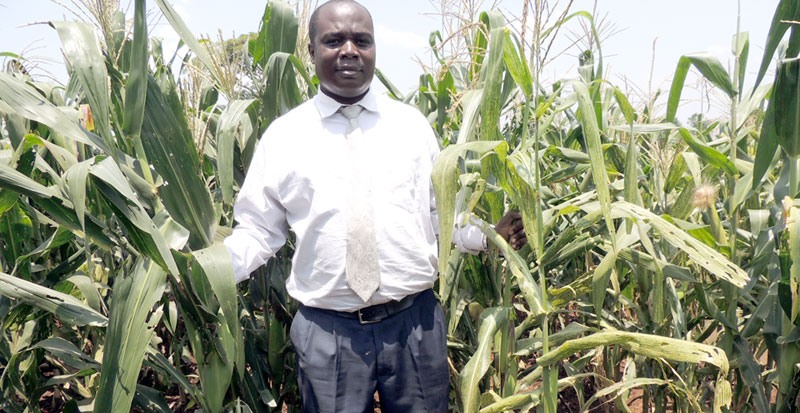

National Crops Resources Research Institute (NaCRRI) Director Dr. Godfrey Asea shows the difference in pest resistance between GM and non-GM maize. The greener maize is GM.
Nigeria has taken yet another bold step in embracing modern biotechnology when its regulators approved trials of Genetically Modified (GM) TELA Maize to take place on farmers gardens across major maize growing parts of the country.
The decision to approve the drought tolerant and fall armyworm-resistant maize variety, has been praised as a dramatic fast step forward for a country which started trials much later than many countries in Africa including Uganda.
The GM TELA Maize trials that were conducted in confined field in Kasese and at Namulonge proved highly successful in 2017 and in 2018, according to Dr. Godfrey Asea, the Director of Uganda’s National Crops Resources Research Institute (NACRRI).
But President Yoweri Museveni’s decision to delay the passing of the Genetic Engineering and Regulatory Act, which would take similar trials beyond confined fields onto farmer’s gardens, has generally stalled the GM research agenda in Uganda.
Most Ugandan scientists that were championing GM research for maize, bananas, cassava and rice have found greener pastures in other countries.
Uganda’s sudden policy reversal from its earlier stance as a strong supporter of GM research has seen late comers like Kenya, Ethiopia, and now Nigeria, bypass it, by commercializing the technology.
With the recent approval of other GM crops (BT cotton, pod-borer resistant BT cowpea,) by the country’s National Biosafety Management Agency, (NBMA) Nigeria has emerged as a leader on the continent in the adoption of crop biotechnology, just behind South Africa.
Experts say the improved maize would help Nigeria’s smallholder farmers reduce pesticide use, increase yields, support food security and respond to climate extremes.
“This is the beginning of a new era for maize farmers in Nigeria who have suffered greatly from the twin problem of drought and devastating insect pests occasioned by climate change,” said Dr. Sylvester Oikeh, AATF TELA maize project manager. “The resources and time spent in protecting maize against insect pests will be used for other operations. The maize produced will provide healthier grains for farmers and consumers alike.”
“Preliminary trials with TELA hybrids have shown marked differences in yields,” said Prof. Rabiu Adamu, principal investigator of the IAR project. The TELA hybrids could produce up to 7.5 tonnes per hectare, as opposed to current commercial best hybrids that yield 6 tonnes per hectare.
“The benefit of TELA maize to Nigerian farmers will be quite enormous when hybrids are commercially released,” Adamu said. “It will drastically cut yield losses by farmers due to stem borers, fall armyworm and drought by more than 80 percent. This will boost farmers’ production and will generate more income as higher yields will be obtained.”
Listing more advantages of the crop, Prof. Mohammad Ishiyaku, executive director IAR, said it would lower farmers’ production costs as they would no longer have to spend so much on insecticides. TELA varieties can also germinate with even low amounts of rainfall.
“The cost of production is one thing that makes the eventual product expensive,” Ishiyaku said. “So, this is the benefit that farmers will have: they will have more income and we will have a safer environment because there will be no insecticide used to protect the maize.”
Though maize is an important staple food and the most widely grown crop in Nigeria, drought and insect pest pressures have suppressed yields. As a result, Nigeria is still unable to produce the estimated 20 million metric tonnes required annually to meet domestic demand. It currently imports about 8 million tonnes per year.
A similar situation exists with protein-rich cowpea, which is known as the poor man’s meat. GM cowpea, which offers farmers higher yields and a significant reduction in pesticide use, is expected to help reduce the need for imports.
The TELA maize project, previously known as Water Efficient Maize for Africa (WEMA), is a public-private partnership that has developed both GM and conventional maize hybrids that provide drought resistance. The GM varieties also offer protection from some of the worst maize insect pests, including the corn borer and fall armyworm. South Africa has already commercialized the TELA varieties. Kenya and Mozambique have conducted successful field trials. Ethiopia and Tanzania are conducting similar research.
The partnership, which includes scientific and research collaboration, has helped TELA maize to advance efficiently through the development and regulatory process. Nigeria was involved in the TELA maize project for just three years before seeking the environmental release permit. By comparison, it took nearly a decade for Nigerian scientists to move the GM cowpea from concept to commercial release.
Nigeria’s approval of GM TELA Maize heralds bold new chapter in country’s effort to address climate change effects on farmers, say experts
BY Sunrise Reporter
Nigeria has taken yet another bold step in embracing modern biotechnology when it’s regulators approved trials of GM TELA Maize to take place on farmers gardens across major maize growing parts of the country.
The decision to approve the drought tolerant and fall armyworm-resistant maize variety, has been praised as a dramatic fast step forward for a country which started trials much later than many countries in Africa including Uganda.
The GM TELA Maize trials that were conducted in confined field in Kasese and at Namulonge proved highly successful in 2017 and in 2018, according to Dr. Godfrey Asea, the Director of Uganda’s National Crops Resources Research Institute (NACRRI).
But President Yoweri Museveni’s decision to delay the passing of the Genetic Engineering and Regulatory Act, which would take similar trials beyond confined fields onto farmer’s gardens, has generally stalled the GM research agenda in Uganda.
Most Ugandan scientists that were championing GM research for maize, bananas, cassava and rice have found greener pastures in other countries.
Uganda’s sudden policy reversal from its earlier stance as a strong supporter of GM research has seen late comers like Kenya, Ethiopia, and now Nigeria, bypass it, by commercializing the technology.
With the recent approval of other GM crops (BT cotton, pod-borer resistant BT cowpea,) by the country’s National Biosafety Management Agency, (NBMA) Nigeria has emerged as a leader on the continent in the adoption of crop biotechnology, just behind South Africa.
Experts say the improved maize would help Nigeria’s smallholder farmers reduce pesticide use, increase yields, support food security and respond to climate extremes.
“This is the beginning of a new era for maize farmers in Nigeria who have suffered greatly from the twin problem of drought and devastating insect pests occasioned by climate change,” said Dr. Sylvester Oikeh, AATF TELA maize project manager. “The resources and time spent in protecting maize against insect pests will be used for other operations. The maize produced will provide healthier grains for farmers and consumers alike.”
“Preliminary trials with TELA hybrids have shown marked differences in yields,” said Prof. Rabiu Adamu, principal investigator of the IAR project. The TELA hybrids could produce up to 7.5 tonnes per hectare, as opposed to current commercial best hybrids that yield 6 tonnes per hectare.
“The benefit of TELA maize to Nigerian farmers will be quite enormous when hybrids are commercially released,” Adamu said. “It will drastically cut yield losses by farmers due to stem borers, fall armyworm and drought by more than 80 percent. This will boost farmers’ production and will generate more income as higher yields will be obtained.”
Listing more advantages of the crop, Prof. Mohammad Ishiyaku, executive director IAR, said it would lower farmers’ production costs as they would no longer have to spend so much on insecticides. TELA varieties can also germinate with even low amounts of rainfall.
“The cost of production is one thing that makes the eventual product expensive,” Ishiyaku said. “So, this is the benefit that farmers will have: they will have more income and we will have a safer environment because there will be no insecticide used to protect the maize.”
Though maize is an important staple food and the most widely grown crop in Nigeria, drought and insect pest pressures have suppressed yields. As a result, Nigeria is still unable to produce the estimated 20 million metric tonnes required annually to meet domestic demand. It currently imports about 8 million tonnes per year.
A similar situation exists with protein-rich cowpea, which is known as the poor man’s meat. GM cowpea, which offers farmers higher yields and a significant reduction in pesticide use, is expected to help reduce the need for imports.
The TELA maize project, previously known as Water Efficient Maize for Africa (WEMA), is a public-private partnership that has developed both GM and conventional maize hybrids that provide drought resistance. The GM varieties also offer protection from some of the worst maize insect pests, including the corn borer and fall armyworm. South Africa has already commercialized the TELA varieties. Kenya and Mozambique have conducted successful field trials. Ethiopia and Tanzania are conducting similar research.
The partnership, which includes scientific and research collaboration, has helped TELA maize to advance efficiently through the development and regulatory process. Nigeria was involved in the TELA maize project for just three years before seeking the environmental release permit. By comparison, it took nearly a decade for Nigerian scientists to move the GM cowpea from concept to commercial release.














Henry Lutaaya
Leave a Comment
Your email address will not be published.